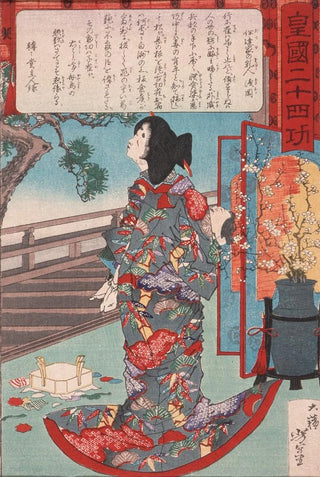Art print | Masaoka, clan nursemaid holding her murdered child - Tsukioka Yoshitoshi


View from behind

Frame (optional)
Masaoka, nurse of the Date clan holding her murdered child: a cry of pain frozen in time
The art print "Masaoka, nurse of the Date clan holding her murdered child" by Tsukioka Yoshitoshi is a poignant depiction of human tragedy. In this dramatic scene, the nurse, with a face filled with despair, cradles the lifeless body of the child, symbolizing an unbearable loss. The dark colors and shades of red enhance the emotional intensity of the composition, while the meticulous details of traditional Japanese clothing add a touch of authenticity. The woodblock print technique, characteristic of ukiyo-e, gives this art print a mood that is both melancholic and tragic, inviting the viewer to reflect on the fragility of life.
Tsukioka Yoshitoshi: a master of ukiyo-e at the heart of modern Japan
Tsukioka Yoshitoshi, one of the last great masters of ukiyo-e, marked the 19th century with his innovative style and ability to capture deep emotions. Born in 1839, he was influenced by the social and political upheavals of his time, notably Japan's transition to modernity. Yoshitoshi managed to blend tradition and modernity, incorporating contemporary themes into his works while respecting ancestral techniques. His career, although marked by periods of depression, produced masterpieces that continue to inspire artists and art lovers today. "Masaoka" is an emblematic example of his talent to evoke pain and beauty in a single breath.
A decorative acquisition with multiple assets
The art print of "Masaoka, nurse of the Date clan holding her murdered child" is a decorative piece that will enhance your interior. Whether in a living room, office, or bedroom, this captivating artwork draws the eye and provokes thought. Its printing quality guarantees remarkable fidelity to the details of the original work, allowing you to feel all the emotion it conveys. By integrating this art print into your decor, you bring a touch of history and culture, while offering your guests an opportunity to discuss and exchange on Japanese art and its profound meanings.

Matte finish

View from behind

Frame (optional)
Masaoka, nurse of the Date clan holding her murdered child: a cry of pain frozen in time
The art print "Masaoka, nurse of the Date clan holding her murdered child" by Tsukioka Yoshitoshi is a poignant depiction of human tragedy. In this dramatic scene, the nurse, with a face filled with despair, cradles the lifeless body of the child, symbolizing an unbearable loss. The dark colors and shades of red enhance the emotional intensity of the composition, while the meticulous details of traditional Japanese clothing add a touch of authenticity. The woodblock print technique, characteristic of ukiyo-e, gives this art print a mood that is both melancholic and tragic, inviting the viewer to reflect on the fragility of life.
Tsukioka Yoshitoshi: a master of ukiyo-e at the heart of modern Japan
Tsukioka Yoshitoshi, one of the last great masters of ukiyo-e, marked the 19th century with his innovative style and ability to capture deep emotions. Born in 1839, he was influenced by the social and political upheavals of his time, notably Japan's transition to modernity. Yoshitoshi managed to blend tradition and modernity, incorporating contemporary themes into his works while respecting ancestral techniques. His career, although marked by periods of depression, produced masterpieces that continue to inspire artists and art lovers today. "Masaoka" is an emblematic example of his talent to evoke pain and beauty in a single breath.
A decorative acquisition with multiple assets
The art print of "Masaoka, nurse of the Date clan holding her murdered child" is a decorative piece that will enhance your interior. Whether in a living room, office, or bedroom, this captivating artwork draws the eye and provokes thought. Its printing quality guarantees remarkable fidelity to the details of the original work, allowing you to feel all the emotion it conveys. By integrating this art print into your decor, you bring a touch of history and culture, while offering your guests an opportunity to discuss and exchange on Japanese art and its profound meanings.






